An Analysis of Entrepreneurship, Small Business, and Economic Impact
VerifiedAdded on 2021/02/19
|16
|4864
|22
Report
AI Summary
This report provides a comprehensive overview of entrepreneurship and small business management. It begins by defining entrepreneurship and exploring various venture types, including small business entrepreneurship, scalable start-ups, large company entrepreneurship, and social entrepreneurship, along with their typologies. The report then compares and contrasts different entrepreneurial ventures, highlighting similarities and differences between small and large businesses, as well as scalable and social enterprises. The second part of the report examines the impact of micro and small businesses on the economy, providing statistical data and analyses. It also classifies different types of businesses, such as micro, small, and large businesses, and discusses the benefits of small and micro businesses towards the economy, including employing local workers and adapting to changing climates. The report concludes by examining the characteristics, traits, and skills of successful entrepreneurs, as well as aspects of entrepreneurial personality and the reflection of entrepreneurial motivation and mindset. Finally, it examines how background and experience can hinder and foster entrepreneurship.
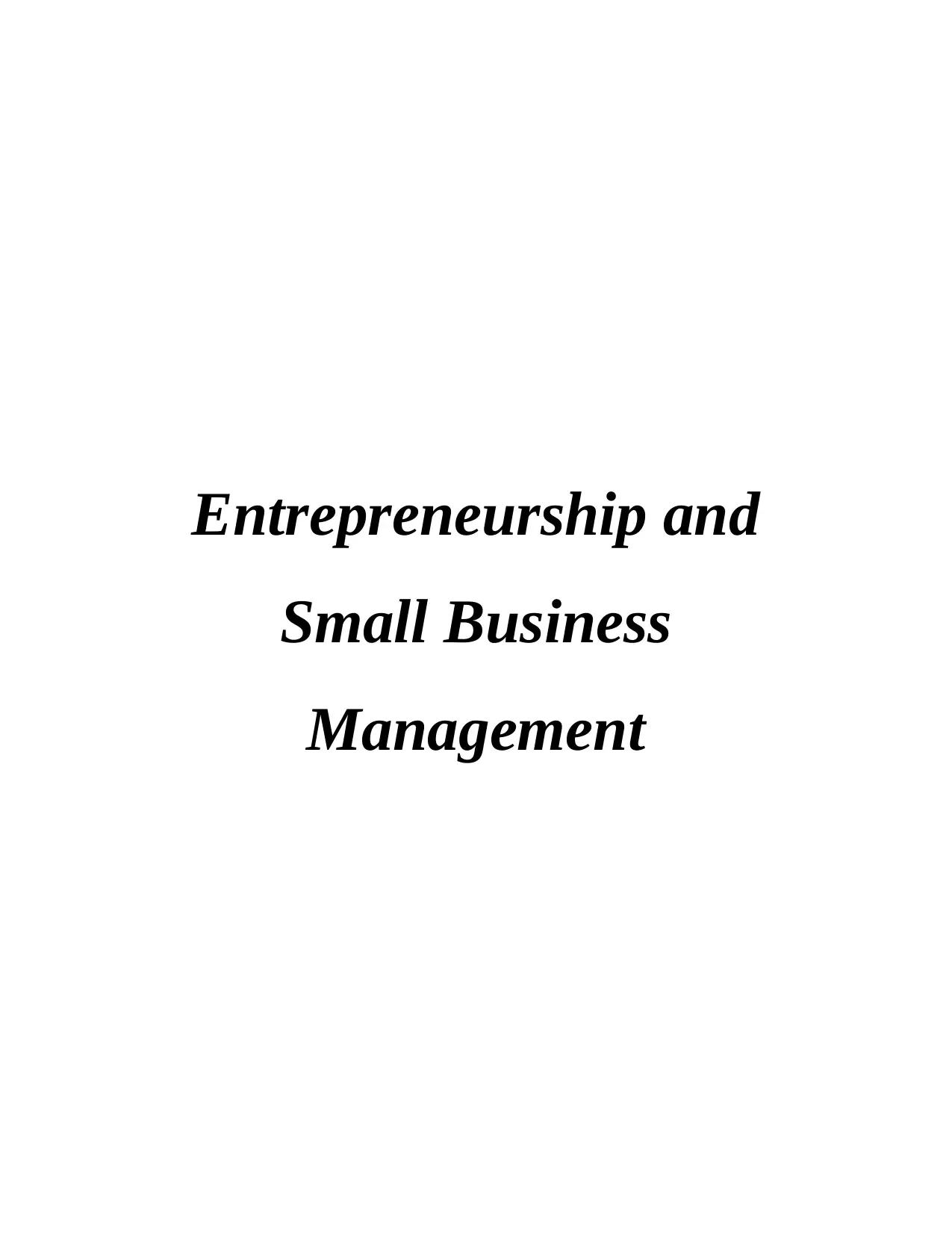
Entrepreneurship and
Small Business
Management
Small Business
Management
Paraphrase This Document
Need a fresh take? Get an instant paraphrase of this document with our AI Paraphraser
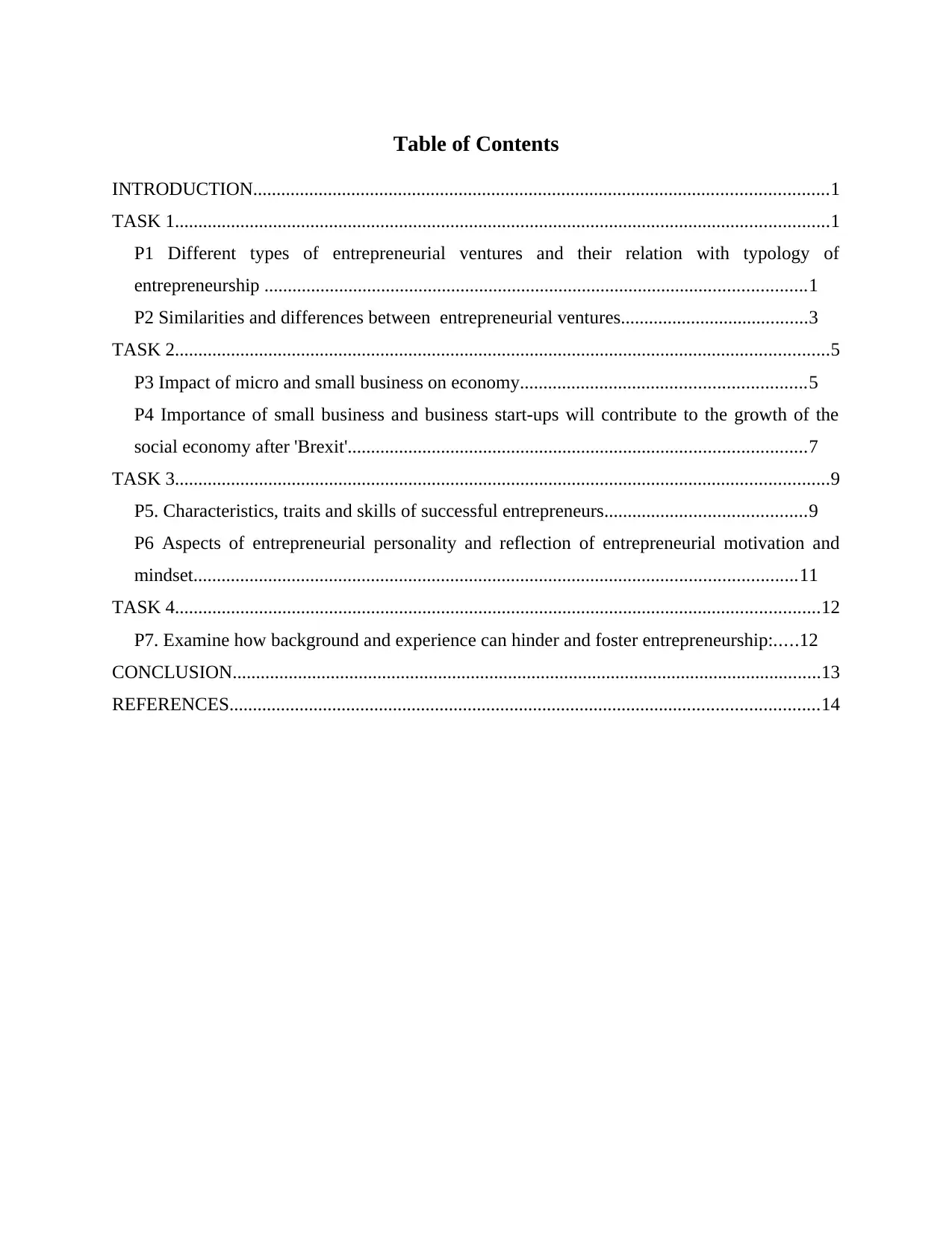
Table of Contents
INTRODUCTION...........................................................................................................................1
TASK 1............................................................................................................................................1
P1 Different types of entrepreneurial ventures and their relation with typology of
entrepreneurship ....................................................................................................................1
P2 Similarities and differences between entrepreneurial ventures........................................3
TASK 2............................................................................................................................................5
P3 Impact of micro and small business on economy.............................................................5
P4 Importance of small business and business start-ups will contribute to the growth of the
social economy after 'Brexit'..................................................................................................7
TASK 3............................................................................................................................................9
P5. Characteristics, traits and skills of successful entrepreneurs...........................................9
P6 Aspects of entrepreneurial personality and reflection of entrepreneurial motivation and
mindset.................................................................................................................................11
TASK 4..........................................................................................................................................12
P7. Examine how background and experience can hinder and foster entrepreneurship:.....12
CONCLUSION..............................................................................................................................13
REFERENCES..............................................................................................................................14
INTRODUCTION...........................................................................................................................1
TASK 1............................................................................................................................................1
P1 Different types of entrepreneurial ventures and their relation with typology of
entrepreneurship ....................................................................................................................1
P2 Similarities and differences between entrepreneurial ventures........................................3
TASK 2............................................................................................................................................5
P3 Impact of micro and small business on economy.............................................................5
P4 Importance of small business and business start-ups will contribute to the growth of the
social economy after 'Brexit'..................................................................................................7
TASK 3............................................................................................................................................9
P5. Characteristics, traits and skills of successful entrepreneurs...........................................9
P6 Aspects of entrepreneurial personality and reflection of entrepreneurial motivation and
mindset.................................................................................................................................11
TASK 4..........................................................................................................................................12
P7. Examine how background and experience can hinder and foster entrepreneurship:.....12
CONCLUSION..............................................................................................................................13
REFERENCES..............................................................................................................................14
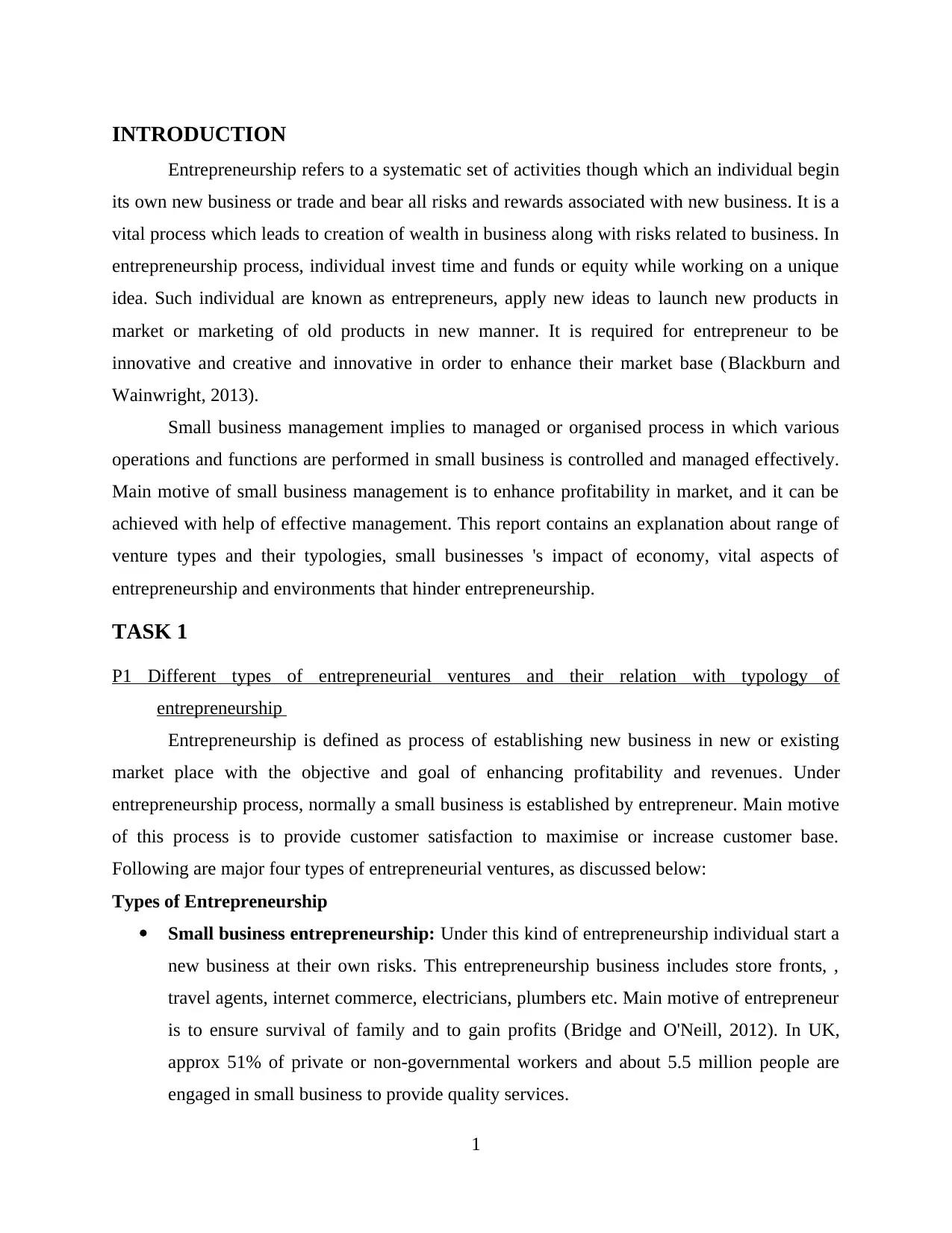
INTRODUCTION
Entrepreneurship refers to a systematic set of activities though which an individual begin
its own new business or trade and bear all risks and rewards associated with new business. It is a
vital process which leads to creation of wealth in business along with risks related to business. In
entrepreneurship process, individual invest time and funds or equity while working on a unique
idea. Such individual are known as entrepreneurs, apply new ideas to launch new products in
market or marketing of old products in new manner. It is required for entrepreneur to be
innovative and creative and innovative in order to enhance their market base (Blackburn and
Wainwright, 2013).
Small business management implies to managed or organised process in which various
operations and functions are performed in small business is controlled and managed effectively.
Main motive of small business management is to enhance profitability in market, and it can be
achieved with help of effective management. This report contains an explanation about range of
venture types and their typologies, small businesses 's impact of economy, vital aspects of
entrepreneurship and environments that hinder entrepreneurship.
TASK 1
P1 Different types of entrepreneurial ventures and their relation with typology of
entrepreneurship
Entrepreneurship is defined as process of establishing new business in new or existing
market place with the objective and goal of enhancing profitability and revenues. Under
entrepreneurship process, normally a small business is established by entrepreneur. Main motive
of this process is to provide customer satisfaction to maximise or increase customer base.
Following are major four types of entrepreneurial ventures, as discussed below:
Types of Entrepreneurship
Small business entrepreneurship: Under this kind of entrepreneurship individual start a
new business at their own risks. This entrepreneurship business includes store fronts, ,
travel agents, internet commerce, electricians, plumbers etc. Main motive of entrepreneur
is to ensure survival of family and to gain profits (Bridge and O'Neill, 2012). In UK,
approx 51% of private or non-governmental workers and about 5.5 million people are
engaged in small business to provide quality services.
1
Entrepreneurship refers to a systematic set of activities though which an individual begin
its own new business or trade and bear all risks and rewards associated with new business. It is a
vital process which leads to creation of wealth in business along with risks related to business. In
entrepreneurship process, individual invest time and funds or equity while working on a unique
idea. Such individual are known as entrepreneurs, apply new ideas to launch new products in
market or marketing of old products in new manner. It is required for entrepreneur to be
innovative and creative and innovative in order to enhance their market base (Blackburn and
Wainwright, 2013).
Small business management implies to managed or organised process in which various
operations and functions are performed in small business is controlled and managed effectively.
Main motive of small business management is to enhance profitability in market, and it can be
achieved with help of effective management. This report contains an explanation about range of
venture types and their typologies, small businesses 's impact of economy, vital aspects of
entrepreneurship and environments that hinder entrepreneurship.
TASK 1
P1 Different types of entrepreneurial ventures and their relation with typology of
entrepreneurship
Entrepreneurship is defined as process of establishing new business in new or existing
market place with the objective and goal of enhancing profitability and revenues. Under
entrepreneurship process, normally a small business is established by entrepreneur. Main motive
of this process is to provide customer satisfaction to maximise or increase customer base.
Following are major four types of entrepreneurial ventures, as discussed below:
Types of Entrepreneurship
Small business entrepreneurship: Under this kind of entrepreneurship individual start a
new business at their own risks. This entrepreneurship business includes store fronts, ,
travel agents, internet commerce, electricians, plumbers etc. Main motive of entrepreneur
is to ensure survival of family and to gain profits (Bridge and O'Neill, 2012). In UK,
approx 51% of private or non-governmental workers and about 5.5 million people are
engaged in small business to provide quality services.
1
⊘ This is a preview!⊘
Do you want full access?
Subscribe today to unlock all pages.

Trusted by 1+ million students worldwide
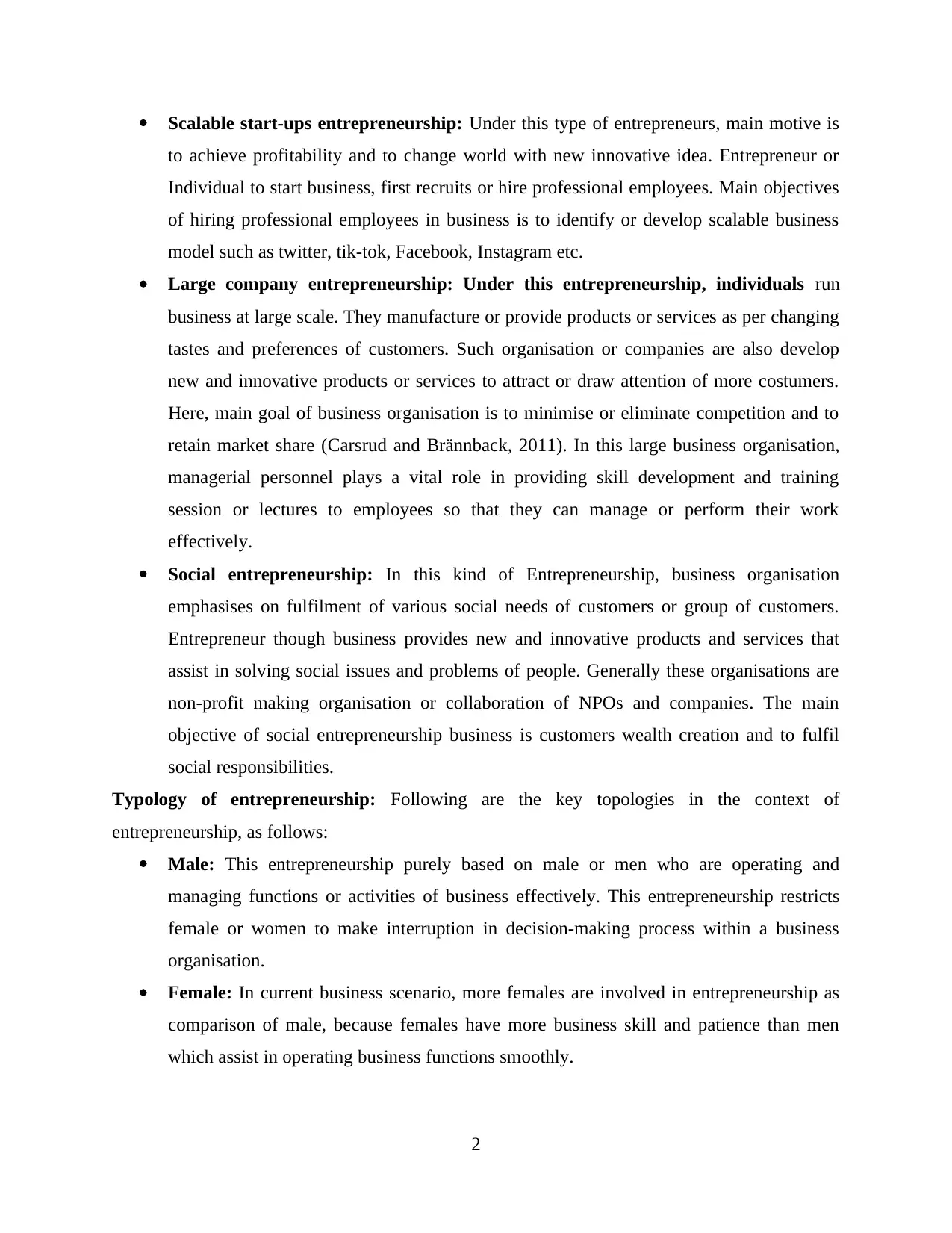
Scalable start-ups entrepreneurship: Under this type of entrepreneurs, main motive is
to achieve profitability and to change world with new innovative idea. Entrepreneur or
Individual to start business, first recruits or hire professional employees. Main objectives
of hiring professional employees in business is to identify or develop scalable business
model such as twitter, tik-tok, Facebook, Instagram etc.
Large company entrepreneurship: Under this entrepreneurship, individuals run
business at large scale. They manufacture or provide products or services as per changing
tastes and preferences of customers. Such organisation or companies are also develop
new and innovative products or services to attract or draw attention of more costumers.
Here, main goal of business organisation is to minimise or eliminate competition and to
retain market share (Carsrud and Brännback, 2011). In this large business organisation,
managerial personnel plays a vital role in providing skill development and training
session or lectures to employees so that they can manage or perform their work
effectively.
Social entrepreneurship: In this kind of Entrepreneurship, business organisation
emphasises on fulfilment of various social needs of customers or group of customers.
Entrepreneur though business provides new and innovative products and services that
assist in solving social issues and problems of people. Generally these organisations are
non-profit making organisation or collaboration of NPOs and companies. The main
objective of social entrepreneurship business is customers wealth creation and to fulfil
social responsibilities.
Typology of entrepreneurship: Following are the key topologies in the context of
entrepreneurship, as follows:
Male: This entrepreneurship purely based on male or men who are operating and
managing functions or activities of business effectively. This entrepreneurship restricts
female or women to make interruption in decision-making process within a business
organisation.
Female: In current business scenario, more females are involved in entrepreneurship as
comparison of male, because females have more business skill and patience than men
which assist in operating business functions smoothly.
2
to achieve profitability and to change world with new innovative idea. Entrepreneur or
Individual to start business, first recruits or hire professional employees. Main objectives
of hiring professional employees in business is to identify or develop scalable business
model such as twitter, tik-tok, Facebook, Instagram etc.
Large company entrepreneurship: Under this entrepreneurship, individuals run
business at large scale. They manufacture or provide products or services as per changing
tastes and preferences of customers. Such organisation or companies are also develop
new and innovative products or services to attract or draw attention of more costumers.
Here, main goal of business organisation is to minimise or eliminate competition and to
retain market share (Carsrud and Brännback, 2011). In this large business organisation,
managerial personnel plays a vital role in providing skill development and training
session or lectures to employees so that they can manage or perform their work
effectively.
Social entrepreneurship: In this kind of Entrepreneurship, business organisation
emphasises on fulfilment of various social needs of customers or group of customers.
Entrepreneur though business provides new and innovative products and services that
assist in solving social issues and problems of people. Generally these organisations are
non-profit making organisation or collaboration of NPOs and companies. The main
objective of social entrepreneurship business is customers wealth creation and to fulfil
social responsibilities.
Typology of entrepreneurship: Following are the key topologies in the context of
entrepreneurship, as follows:
Male: This entrepreneurship purely based on male or men who are operating and
managing functions or activities of business effectively. This entrepreneurship restricts
female or women to make interruption in decision-making process within a business
organisation.
Female: In current business scenario, more females are involved in entrepreneurship as
comparison of male, because females have more business skill and patience than men
which assist in operating business functions smoothly.
2
Paraphrase This Document
Need a fresh take? Get an instant paraphrase of this document with our AI Paraphraser
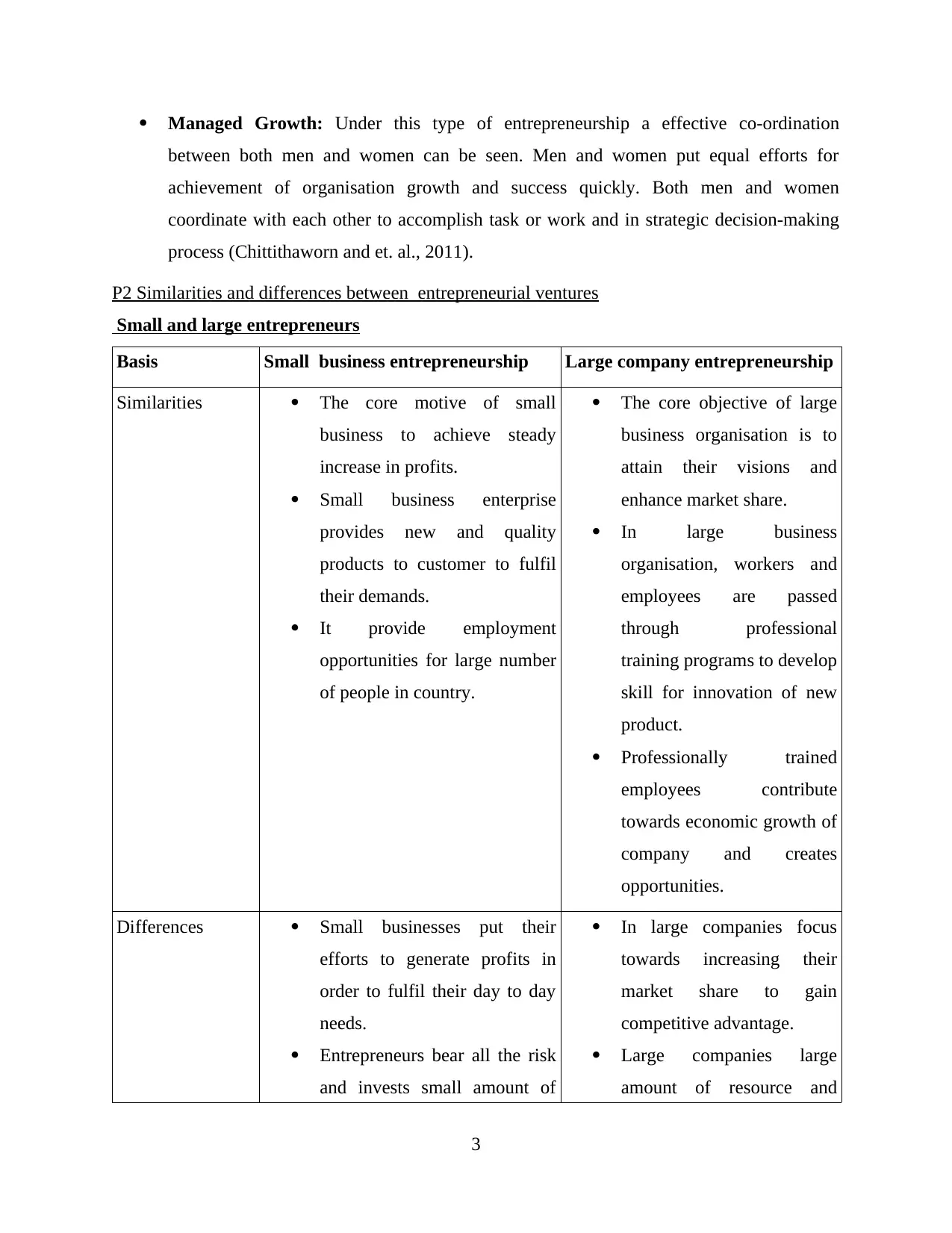
Managed Growth: Under this type of entrepreneurship a effective co-ordination
between both men and women can be seen. Men and women put equal efforts for
achievement of organisation growth and success quickly. Both men and women
coordinate with each other to accomplish task or work and in strategic decision-making
process (Chittithaworn and et. al., 2011).
P2 Similarities and differences between entrepreneurial ventures
Small and large entrepreneurs
Basis Small business entrepreneurship Large company entrepreneurship
Similarities The core motive of small
business to achieve steady
increase in profits.
Small business enterprise
provides new and quality
products to customer to fulfil
their demands.
It provide employment
opportunities for large number
of people in country.
The core objective of large
business organisation is to
attain their visions and
enhance market share.
In large business
organisation, workers and
employees are passed
through professional
training programs to develop
skill for innovation of new
product.
Professionally trained
employees contribute
towards economic growth of
company and creates
opportunities.
Differences Small businesses put their
efforts to generate profits in
order to fulfil their day to day
needs.
Entrepreneurs bear all the risk
and invests small amount of
In large companies focus
towards increasing their
market share to gain
competitive advantage.
Large companies large
amount of resource and
3
between both men and women can be seen. Men and women put equal efforts for
achievement of organisation growth and success quickly. Both men and women
coordinate with each other to accomplish task or work and in strategic decision-making
process (Chittithaworn and et. al., 2011).
P2 Similarities and differences between entrepreneurial ventures
Small and large entrepreneurs
Basis Small business entrepreneurship Large company entrepreneurship
Similarities The core motive of small
business to achieve steady
increase in profits.
Small business enterprise
provides new and quality
products to customer to fulfil
their demands.
It provide employment
opportunities for large number
of people in country.
The core objective of large
business organisation is to
attain their visions and
enhance market share.
In large business
organisation, workers and
employees are passed
through professional
training programs to develop
skill for innovation of new
product.
Professionally trained
employees contribute
towards economic growth of
company and creates
opportunities.
Differences Small businesses put their
efforts to generate profits in
order to fulfil their day to day
needs.
Entrepreneurs bear all the risk
and invests small amount of
In large companies focus
towards increasing their
market share to gain
competitive advantage.
Large companies large
amount of resource and
3
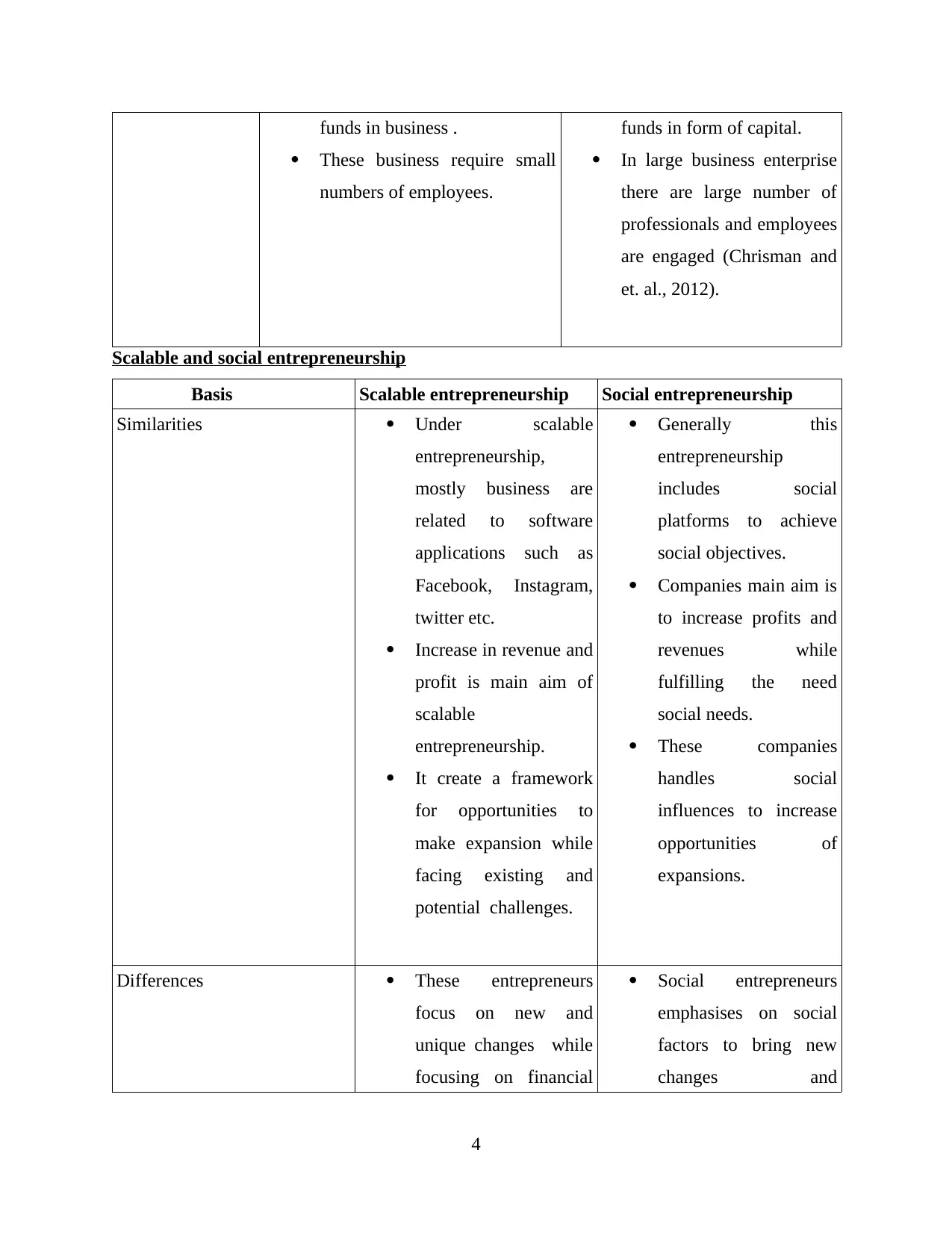
funds in business .
These business require small
numbers of employees.
funds in form of capital.
In large business enterprise
there are large number of
professionals and employees
are engaged (Chrisman and
et. al., 2012).
Scalable and social entrepreneurship
Basis Scalable entrepreneurship Social entrepreneurship
Similarities Under scalable
entrepreneurship,
mostly business are
related to software
applications such as
Facebook, Instagram,
twitter etc.
Increase in revenue and
profit is main aim of
scalable
entrepreneurship.
It create a framework
for opportunities to
make expansion while
facing existing and
potential challenges.
Generally this
entrepreneurship
includes social
platforms to achieve
social objectives.
Companies main aim is
to increase profits and
revenues while
fulfilling the need
social needs.
These companies
handles social
influences to increase
opportunities of
expansions.
Differences These entrepreneurs
focus on new and
unique changes while
focusing on financial
Social entrepreneurs
emphasises on social
factors to bring new
changes and
4
These business require small
numbers of employees.
funds in form of capital.
In large business enterprise
there are large number of
professionals and employees
are engaged (Chrisman and
et. al., 2012).
Scalable and social entrepreneurship
Basis Scalable entrepreneurship Social entrepreneurship
Similarities Under scalable
entrepreneurship,
mostly business are
related to software
applications such as
Facebook, Instagram,
twitter etc.
Increase in revenue and
profit is main aim of
scalable
entrepreneurship.
It create a framework
for opportunities to
make expansion while
facing existing and
potential challenges.
Generally this
entrepreneurship
includes social
platforms to achieve
social objectives.
Companies main aim is
to increase profits and
revenues while
fulfilling the need
social needs.
These companies
handles social
influences to increase
opportunities of
expansions.
Differences These entrepreneurs
focus on new and
unique changes while
focusing on financial
Social entrepreneurs
emphasises on social
factors to bring new
changes and
4
⊘ This is a preview!⊘
Do you want full access?
Subscribe today to unlock all pages.

Trusted by 1+ million students worldwide
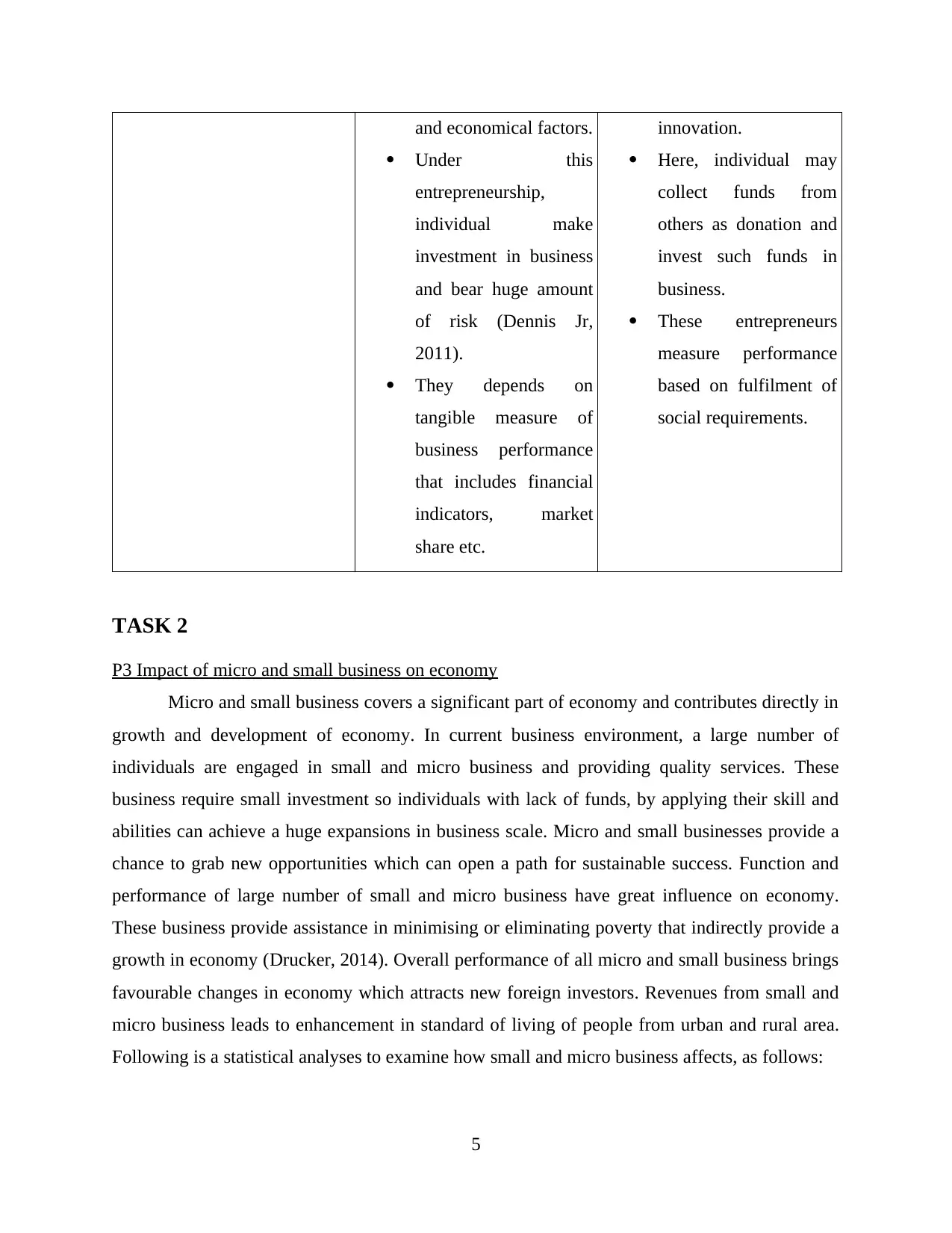
and economical factors.
Under this
entrepreneurship,
individual make
investment in business
and bear huge amount
of risk (Dennis Jr,
2011).
They depends on
tangible measure of
business performance
that includes financial
indicators, market
share etc.
innovation.
Here, individual may
collect funds from
others as donation and
invest such funds in
business.
These entrepreneurs
measure performance
based on fulfilment of
social requirements.
TASK 2
P3 Impact of micro and small business on economy
Micro and small business covers a significant part of economy and contributes directly in
growth and development of economy. In current business environment, a large number of
individuals are engaged in small and micro business and providing quality services. These
business require small investment so individuals with lack of funds, by applying their skill and
abilities can achieve a huge expansions in business scale. Micro and small businesses provide a
chance to grab new opportunities which can open a path for sustainable success. Function and
performance of large number of small and micro business have great influence on economy.
These business provide assistance in minimising or eliminating poverty that indirectly provide a
growth in economy (Drucker, 2014). Overall performance of all micro and small business brings
favourable changes in economy which attracts new foreign investors. Revenues from small and
micro business leads to enhancement in standard of living of people from urban and rural area.
Following is a statistical analyses to examine how small and micro business affects, as follows:
5
Under this
entrepreneurship,
individual make
investment in business
and bear huge amount
of risk (Dennis Jr,
2011).
They depends on
tangible measure of
business performance
that includes financial
indicators, market
share etc.
innovation.
Here, individual may
collect funds from
others as donation and
invest such funds in
business.
These entrepreneurs
measure performance
based on fulfilment of
social requirements.
TASK 2
P3 Impact of micro and small business on economy
Micro and small business covers a significant part of economy and contributes directly in
growth and development of economy. In current business environment, a large number of
individuals are engaged in small and micro business and providing quality services. These
business require small investment so individuals with lack of funds, by applying their skill and
abilities can achieve a huge expansions in business scale. Micro and small businesses provide a
chance to grab new opportunities which can open a path for sustainable success. Function and
performance of large number of small and micro business have great influence on economy.
These business provide assistance in minimising or eliminating poverty that indirectly provide a
growth in economy (Drucker, 2014). Overall performance of all micro and small business brings
favourable changes in economy which attracts new foreign investors. Revenues from small and
micro business leads to enhancement in standard of living of people from urban and rural area.
Following is a statistical analyses to examine how small and micro business affects, as follows:
5
Paraphrase This Document
Need a fresh take? Get an instant paraphrase of this document with our AI Paraphraser
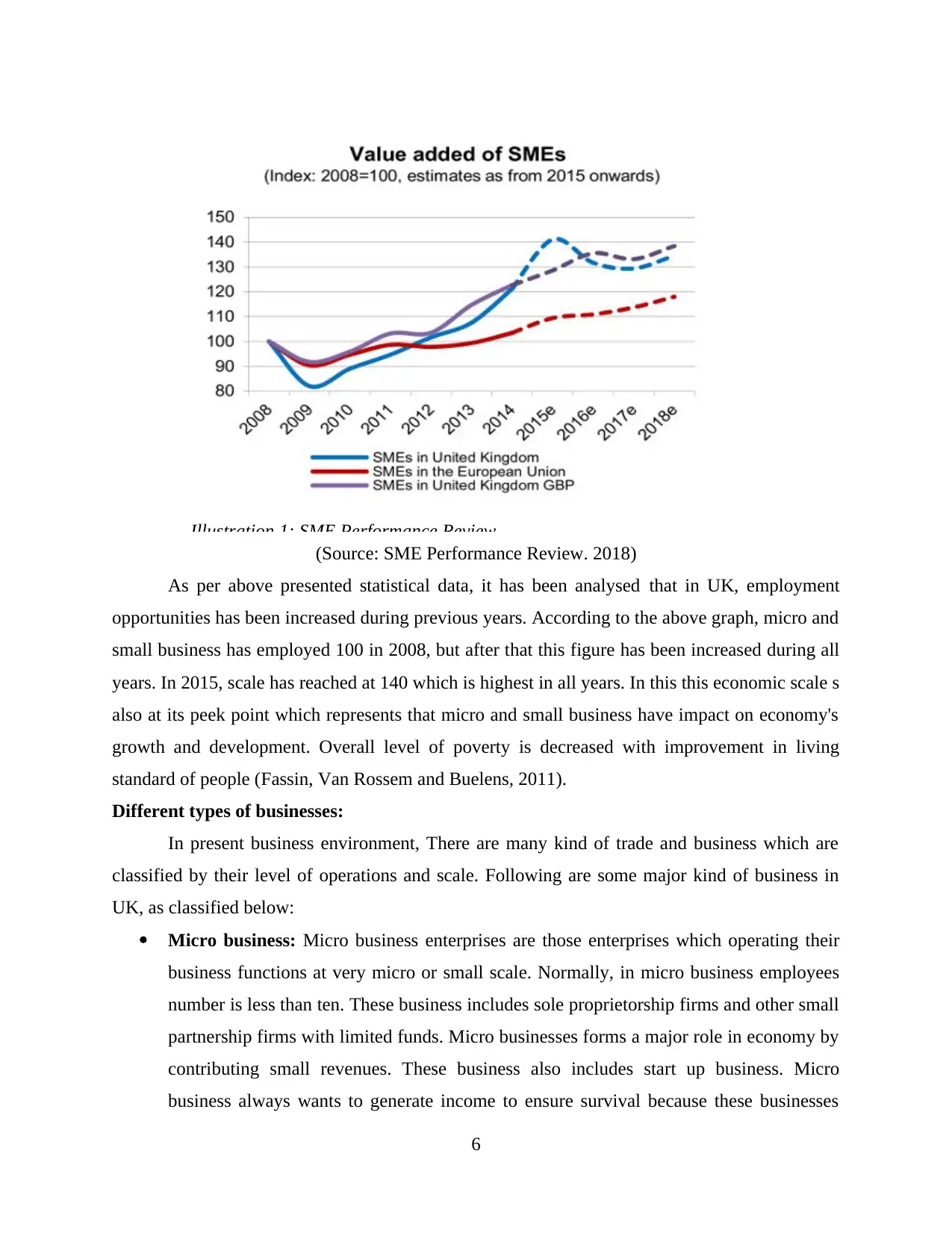
(Source: SME Performance Review. 2018)
As per above presented statistical data, it has been analysed that in UK, employment
opportunities has been increased during previous years. According to the above graph, micro and
small business has employed 100 in 2008, but after that this figure has been increased during all
years. In 2015, scale has reached at 140 which is highest in all years. In this this economic scale s
also at its peek point which represents that micro and small business have impact on economy's
growth and development. Overall level of poverty is decreased with improvement in living
standard of people (Fassin, Van Rossem and Buelens, 2011).
Different types of businesses:
In present business environment, There are many kind of trade and business which are
classified by their level of operations and scale. Following are some major kind of business in
UK, as classified below:
Micro business: Micro business enterprises are those enterprises which operating their
business functions at very micro or small scale. Normally, in micro business employees
number is less than ten. These business includes sole proprietorship firms and other small
partnership firms with limited funds. Micro businesses forms a major role in economy by
contributing small revenues. These business also includes start up business. Micro
business always wants to generate income to ensure survival because these businesses
6
Illustration 1: SME Performance Review
As per above presented statistical data, it has been analysed that in UK, employment
opportunities has been increased during previous years. According to the above graph, micro and
small business has employed 100 in 2008, but after that this figure has been increased during all
years. In 2015, scale has reached at 140 which is highest in all years. In this this economic scale s
also at its peek point which represents that micro and small business have impact on economy's
growth and development. Overall level of poverty is decreased with improvement in living
standard of people (Fassin, Van Rossem and Buelens, 2011).
Different types of businesses:
In present business environment, There are many kind of trade and business which are
classified by their level of operations and scale. Following are some major kind of business in
UK, as classified below:
Micro business: Micro business enterprises are those enterprises which operating their
business functions at very micro or small scale. Normally, in micro business employees
number is less than ten. These business includes sole proprietorship firms and other small
partnership firms with limited funds. Micro businesses forms a major role in economy by
contributing small revenues. These business also includes start up business. Micro
business always wants to generate income to ensure survival because these businesses
6
Illustration 1: SME Performance Review
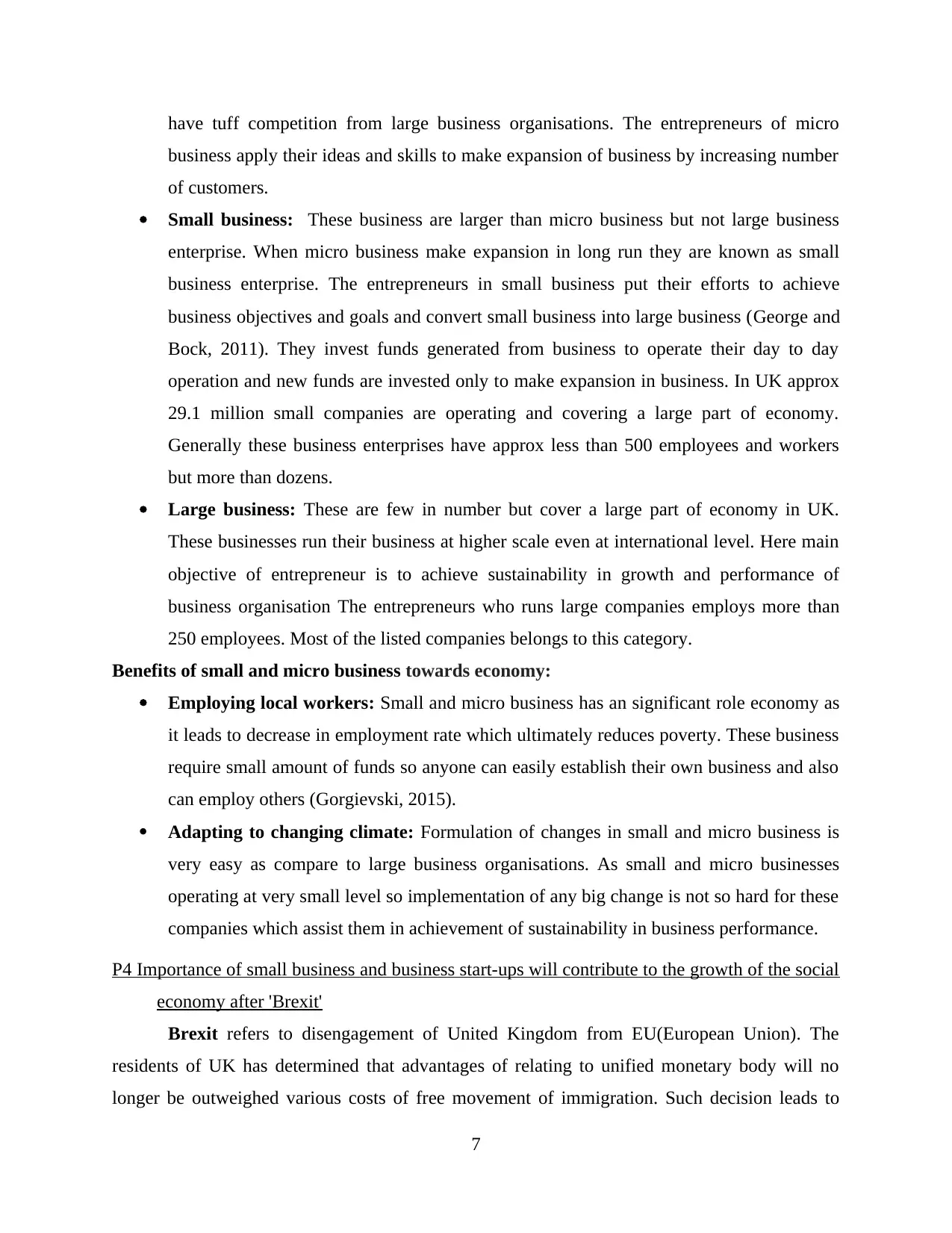
have tuff competition from large business organisations. The entrepreneurs of micro
business apply their ideas and skills to make expansion of business by increasing number
of customers.
Small business: These business are larger than micro business but not large business
enterprise. When micro business make expansion in long run they are known as small
business enterprise. The entrepreneurs in small business put their efforts to achieve
business objectives and goals and convert small business into large business (George and
Bock, 2011). They invest funds generated from business to operate their day to day
operation and new funds are invested only to make expansion in business. In UK approx
29.1 million small companies are operating and covering a large part of economy.
Generally these business enterprises have approx less than 500 employees and workers
but more than dozens.
Large business: These are few in number but cover a large part of economy in UK.
These businesses run their business at higher scale even at international level. Here main
objective of entrepreneur is to achieve sustainability in growth and performance of
business organisation The entrepreneurs who runs large companies employs more than
250 employees. Most of the listed companies belongs to this category.
Benefits of small and micro business towards economy:
Employing local workers: Small and micro business has an significant role economy as
it leads to decrease in employment rate which ultimately reduces poverty. These business
require small amount of funds so anyone can easily establish their own business and also
can employ others (Gorgievski, 2015).
Adapting to changing climate: Formulation of changes in small and micro business is
very easy as compare to large business organisations. As small and micro businesses
operating at very small level so implementation of any big change is not so hard for these
companies which assist them in achievement of sustainability in business performance.
P4 Importance of small business and business start-ups will contribute to the growth of the social
economy after 'Brexit'
Brexit refers to disengagement of United Kingdom from EU(European Union). The
residents of UK has determined that advantages of relating to unified monetary body will no
longer be outweighed various costs of free movement of immigration. Such decision leads to
7
business apply their ideas and skills to make expansion of business by increasing number
of customers.
Small business: These business are larger than micro business but not large business
enterprise. When micro business make expansion in long run they are known as small
business enterprise. The entrepreneurs in small business put their efforts to achieve
business objectives and goals and convert small business into large business (George and
Bock, 2011). They invest funds generated from business to operate their day to day
operation and new funds are invested only to make expansion in business. In UK approx
29.1 million small companies are operating and covering a large part of economy.
Generally these business enterprises have approx less than 500 employees and workers
but more than dozens.
Large business: These are few in number but cover a large part of economy in UK.
These businesses run their business at higher scale even at international level. Here main
objective of entrepreneur is to achieve sustainability in growth and performance of
business organisation The entrepreneurs who runs large companies employs more than
250 employees. Most of the listed companies belongs to this category.
Benefits of small and micro business towards economy:
Employing local workers: Small and micro business has an significant role economy as
it leads to decrease in employment rate which ultimately reduces poverty. These business
require small amount of funds so anyone can easily establish their own business and also
can employ others (Gorgievski, 2015).
Adapting to changing climate: Formulation of changes in small and micro business is
very easy as compare to large business organisations. As small and micro businesses
operating at very small level so implementation of any big change is not so hard for these
companies which assist them in achievement of sustainability in business performance.
P4 Importance of small business and business start-ups will contribute to the growth of the social
economy after 'Brexit'
Brexit refers to disengagement of United Kingdom from EU(European Union). The
residents of UK has determined that advantages of relating to unified monetary body will no
longer be outweighed various costs of free movement of immigration. Such decision leads to
7
⊘ This is a preview!⊘
Do you want full access?
Subscribe today to unlock all pages.

Trusted by 1+ million students worldwide
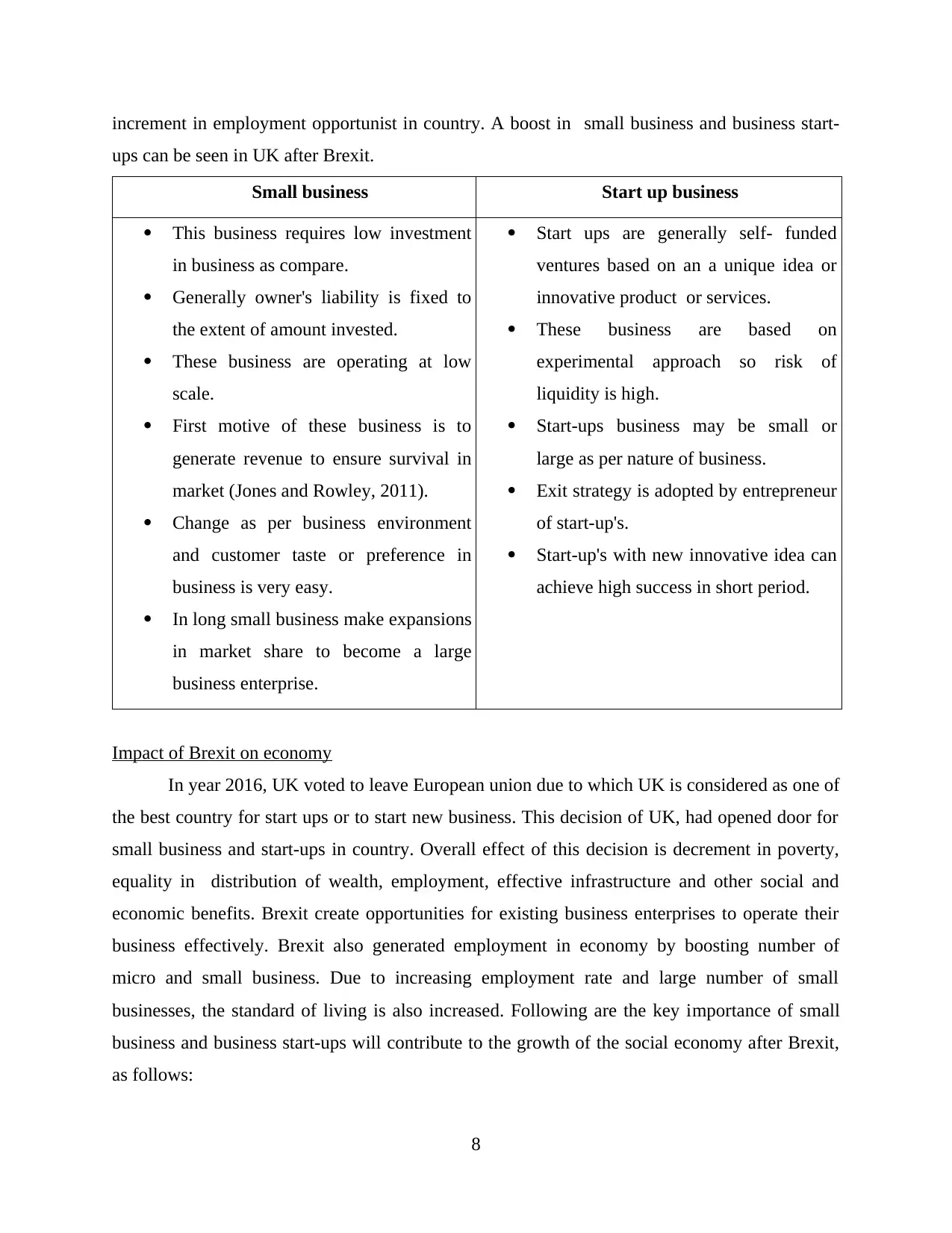
increment in employment opportunist in country. A boost in small business and business start-
ups can be seen in UK after Brexit.
Small business Start up business
This business requires low investment
in business as compare.
Generally owner's liability is fixed to
the extent of amount invested.
These business are operating at low
scale.
First motive of these business is to
generate revenue to ensure survival in
market (Jones and Rowley, 2011).
Change as per business environment
and customer taste or preference in
business is very easy.
In long small business make expansions
in market share to become a large
business enterprise.
Start ups are generally self- funded
ventures based on an a unique idea or
innovative product or services.
These business are based on
experimental approach so risk of
liquidity is high.
Start-ups business may be small or
large as per nature of business.
Exit strategy is adopted by entrepreneur
of start-up's.
Start-up's with new innovative idea can
achieve high success in short period.
Impact of Brexit on economy
In year 2016, UK voted to leave European union due to which UK is considered as one of
the best country for start ups or to start new business. This decision of UK, had opened door for
small business and start-ups in country. Overall effect of this decision is decrement in poverty,
equality in distribution of wealth, employment, effective infrastructure and other social and
economic benefits. Brexit create opportunities for existing business enterprises to operate their
business effectively. Brexit also generated employment in economy by boosting number of
micro and small business. Due to increasing employment rate and large number of small
businesses, the standard of living is also increased. Following are the key importance of small
business and business start-ups will contribute to the growth of the social economy after Brexit,
as follows:
8
ups can be seen in UK after Brexit.
Small business Start up business
This business requires low investment
in business as compare.
Generally owner's liability is fixed to
the extent of amount invested.
These business are operating at low
scale.
First motive of these business is to
generate revenue to ensure survival in
market (Jones and Rowley, 2011).
Change as per business environment
and customer taste or preference in
business is very easy.
In long small business make expansions
in market share to become a large
business enterprise.
Start ups are generally self- funded
ventures based on an a unique idea or
innovative product or services.
These business are based on
experimental approach so risk of
liquidity is high.
Start-ups business may be small or
large as per nature of business.
Exit strategy is adopted by entrepreneur
of start-up's.
Start-up's with new innovative idea can
achieve high success in short period.
Impact of Brexit on economy
In year 2016, UK voted to leave European union due to which UK is considered as one of
the best country for start ups or to start new business. This decision of UK, had opened door for
small business and start-ups in country. Overall effect of this decision is decrement in poverty,
equality in distribution of wealth, employment, effective infrastructure and other social and
economic benefits. Brexit create opportunities for existing business enterprises to operate their
business effectively. Brexit also generated employment in economy by boosting number of
micro and small business. Due to increasing employment rate and large number of small
businesses, the standard of living is also increased. Following are the key importance of small
business and business start-ups will contribute to the growth of the social economy after Brexit,
as follows:
8
Paraphrase This Document
Need a fresh take? Get an instant paraphrase of this document with our AI Paraphraser
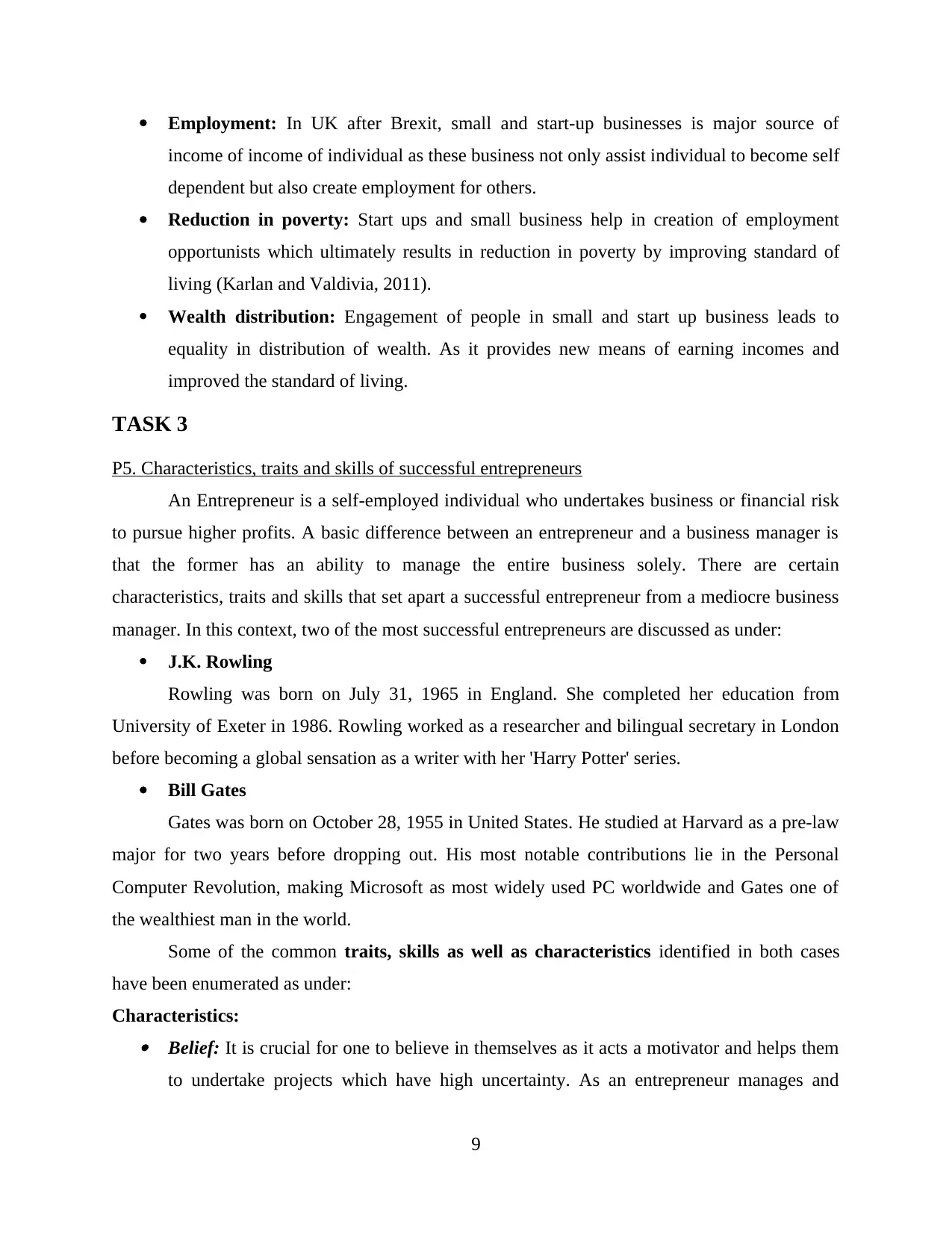
Employment: In UK after Brexit, small and start-up businesses is major source of
income of income of individual as these business not only assist individual to become self
dependent but also create employment for others.
Reduction in poverty: Start ups and small business help in creation of employment
opportunists which ultimately results in reduction in poverty by improving standard of
living (Karlan and Valdivia, 2011).
Wealth distribution: Engagement of people in small and start up business leads to
equality in distribution of wealth. As it provides new means of earning incomes and
improved the standard of living.
TASK 3
P5. Characteristics, traits and skills of successful entrepreneurs
An Entrepreneur is a self-employed individual who undertakes business or financial risk
to pursue higher profits. A basic difference between an entrepreneur and a business manager is
that the former has an ability to manage the entire business solely. There are certain
characteristics, traits and skills that set apart a successful entrepreneur from a mediocre business
manager. In this context, two of the most successful entrepreneurs are discussed as under:
J.K. Rowling
Rowling was born on July 31, 1965 in England. She completed her education from
University of Exeter in 1986. Rowling worked as a researcher and bilingual secretary in London
before becoming a global sensation as a writer with her 'Harry Potter' series.
Bill Gates
Gates was born on October 28, 1955 in United States. He studied at Harvard as a pre-law
major for two years before dropping out. His most notable contributions lie in the Personal
Computer Revolution, making Microsoft as most widely used PC worldwide and Gates one of
the wealthiest man in the world.
Some of the common traits, skills as well as characteristics identified in both cases
have been enumerated as under:
Characteristics: Belief: It is crucial for one to believe in themselves as it acts a motivator and helps them
to undertake projects which have high uncertainty. As an entrepreneur manages and
9
income of income of individual as these business not only assist individual to become self
dependent but also create employment for others.
Reduction in poverty: Start ups and small business help in creation of employment
opportunists which ultimately results in reduction in poverty by improving standard of
living (Karlan and Valdivia, 2011).
Wealth distribution: Engagement of people in small and start up business leads to
equality in distribution of wealth. As it provides new means of earning incomes and
improved the standard of living.
TASK 3
P5. Characteristics, traits and skills of successful entrepreneurs
An Entrepreneur is a self-employed individual who undertakes business or financial risk
to pursue higher profits. A basic difference between an entrepreneur and a business manager is
that the former has an ability to manage the entire business solely. There are certain
characteristics, traits and skills that set apart a successful entrepreneur from a mediocre business
manager. In this context, two of the most successful entrepreneurs are discussed as under:
J.K. Rowling
Rowling was born on July 31, 1965 in England. She completed her education from
University of Exeter in 1986. Rowling worked as a researcher and bilingual secretary in London
before becoming a global sensation as a writer with her 'Harry Potter' series.
Bill Gates
Gates was born on October 28, 1955 in United States. He studied at Harvard as a pre-law
major for two years before dropping out. His most notable contributions lie in the Personal
Computer Revolution, making Microsoft as most widely used PC worldwide and Gates one of
the wealthiest man in the world.
Some of the common traits, skills as well as characteristics identified in both cases
have been enumerated as under:
Characteristics: Belief: It is crucial for one to believe in themselves as it acts a motivator and helps them
to undertake projects which have high uncertainty. As an entrepreneur manages and
9
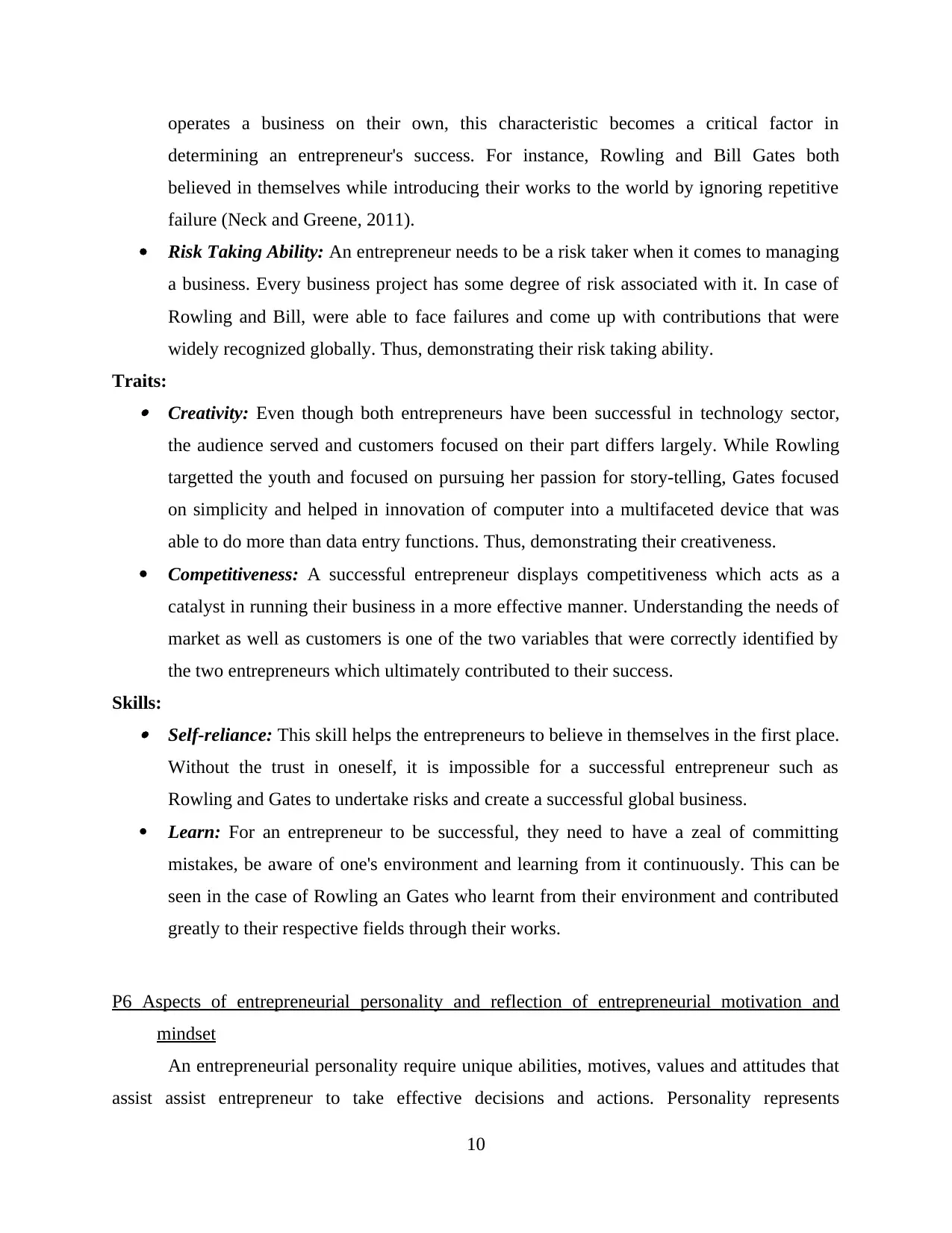
operates a business on their own, this characteristic becomes a critical factor in
determining an entrepreneur's success. For instance, Rowling and Bill Gates both
believed in themselves while introducing their works to the world by ignoring repetitive
failure (Neck and Greene, 2011).
Risk Taking Ability: An entrepreneur needs to be a risk taker when it comes to managing
a business. Every business project has some degree of risk associated with it. In case of
Rowling and Bill, were able to face failures and come up with contributions that were
widely recognized globally. Thus, demonstrating their risk taking ability.
Traits: Creativity: Even though both entrepreneurs have been successful in technology sector,
the audience served and customers focused on their part differs largely. While Rowling
targetted the youth and focused on pursuing her passion for story-telling, Gates focused
on simplicity and helped in innovation of computer into a multifaceted device that was
able to do more than data entry functions. Thus, demonstrating their creativeness.
Competitiveness: A successful entrepreneur displays competitiveness which acts as a
catalyst in running their business in a more effective manner. Understanding the needs of
market as well as customers is one of the two variables that were correctly identified by
the two entrepreneurs which ultimately contributed to their success.
Skills: Self-reliance: This skill helps the entrepreneurs to believe in themselves in the first place.
Without the trust in oneself, it is impossible for a successful entrepreneur such as
Rowling and Gates to undertake risks and create a successful global business.
Learn: For an entrepreneur to be successful, they need to have a zeal of committing
mistakes, be aware of one's environment and learning from it continuously. This can be
seen in the case of Rowling an Gates who learnt from their environment and contributed
greatly to their respective fields through their works.
P6 Aspects of entrepreneurial personality and reflection of entrepreneurial motivation and
mindset
An entrepreneurial personality require unique abilities, motives, values and attitudes that
assist assist entrepreneur to take effective decisions and actions. Personality represents
10
determining an entrepreneur's success. For instance, Rowling and Bill Gates both
believed in themselves while introducing their works to the world by ignoring repetitive
failure (Neck and Greene, 2011).
Risk Taking Ability: An entrepreneur needs to be a risk taker when it comes to managing
a business. Every business project has some degree of risk associated with it. In case of
Rowling and Bill, were able to face failures and come up with contributions that were
widely recognized globally. Thus, demonstrating their risk taking ability.
Traits: Creativity: Even though both entrepreneurs have been successful in technology sector,
the audience served and customers focused on their part differs largely. While Rowling
targetted the youth and focused on pursuing her passion for story-telling, Gates focused
on simplicity and helped in innovation of computer into a multifaceted device that was
able to do more than data entry functions. Thus, demonstrating their creativeness.
Competitiveness: A successful entrepreneur displays competitiveness which acts as a
catalyst in running their business in a more effective manner. Understanding the needs of
market as well as customers is one of the two variables that were correctly identified by
the two entrepreneurs which ultimately contributed to their success.
Skills: Self-reliance: This skill helps the entrepreneurs to believe in themselves in the first place.
Without the trust in oneself, it is impossible for a successful entrepreneur such as
Rowling and Gates to undertake risks and create a successful global business.
Learn: For an entrepreneur to be successful, they need to have a zeal of committing
mistakes, be aware of one's environment and learning from it continuously. This can be
seen in the case of Rowling an Gates who learnt from their environment and contributed
greatly to their respective fields through their works.
P6 Aspects of entrepreneurial personality and reflection of entrepreneurial motivation and
mindset
An entrepreneurial personality require unique abilities, motives, values and attitudes that
assist assist entrepreneur to take effective decisions and actions. Personality represents
10
⊘ This is a preview!⊘
Do you want full access?
Subscribe today to unlock all pages.

Trusted by 1+ million students worldwide
1 out of 16
Related Documents
Your All-in-One AI-Powered Toolkit for Academic Success.
+13062052269
info@desklib.com
Available 24*7 on WhatsApp / Email
![[object Object]](/_next/static/media/star-bottom.7253800d.svg)
Unlock your academic potential
Copyright © 2020–2026 A2Z Services. All Rights Reserved. Developed and managed by ZUCOL.





